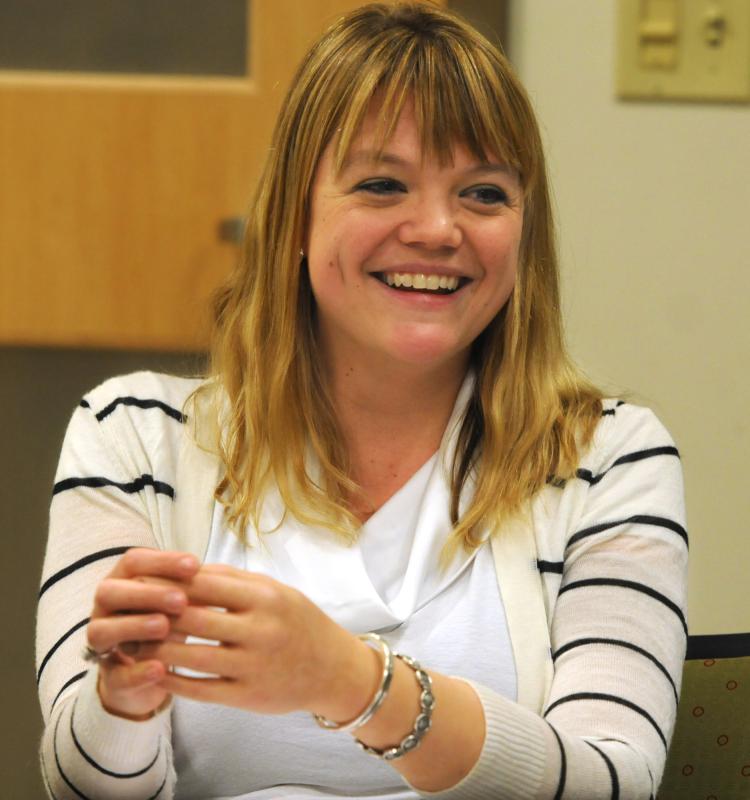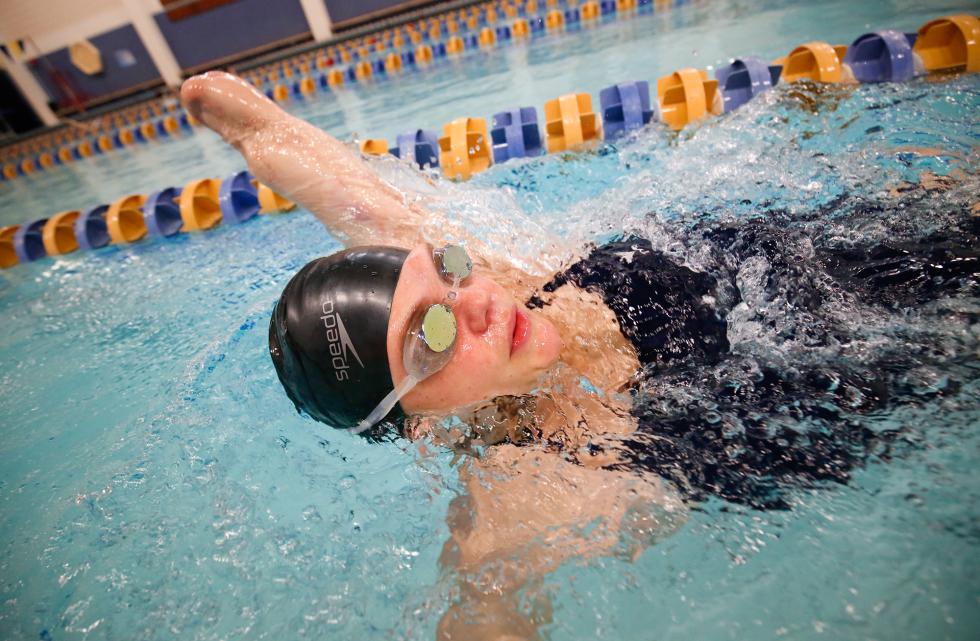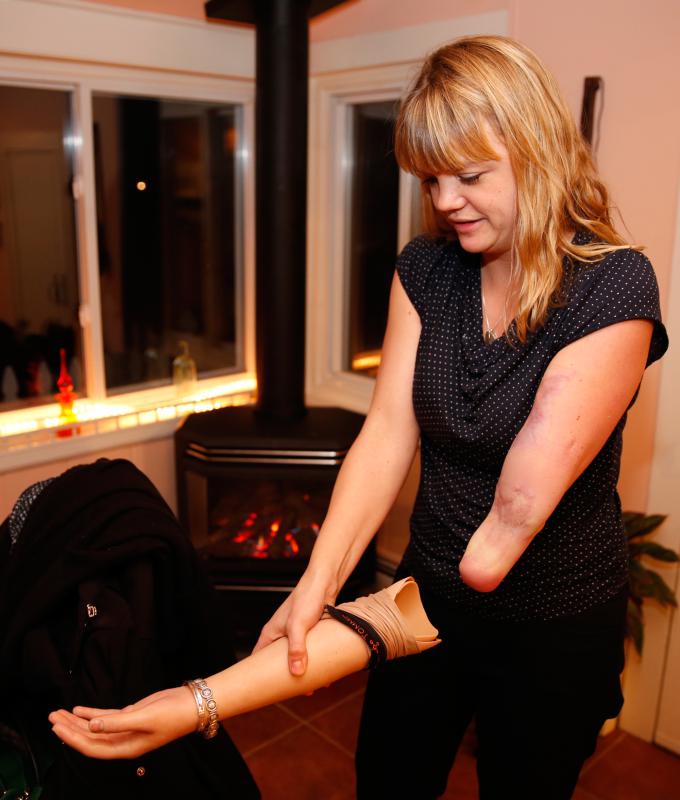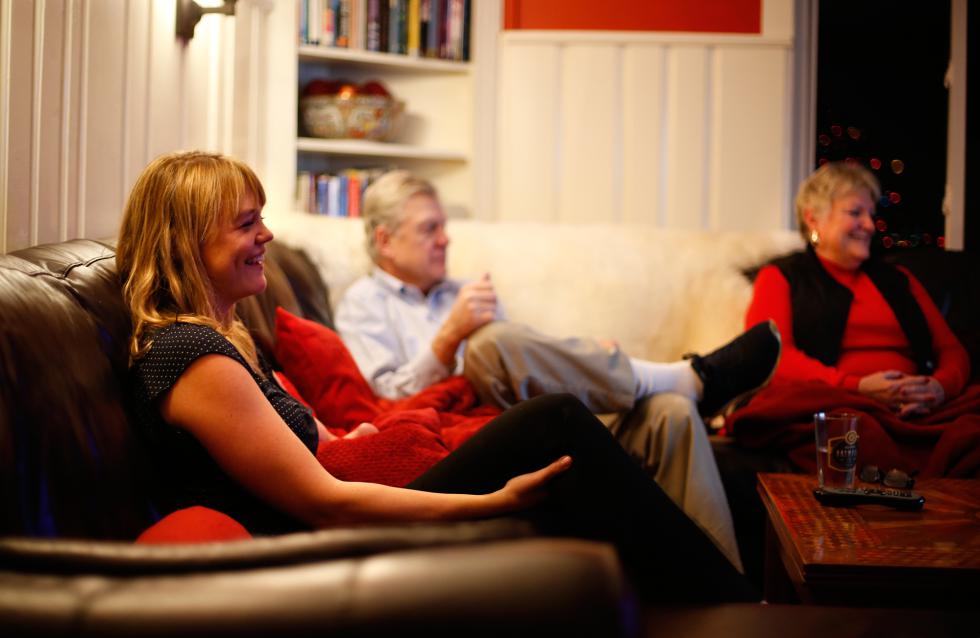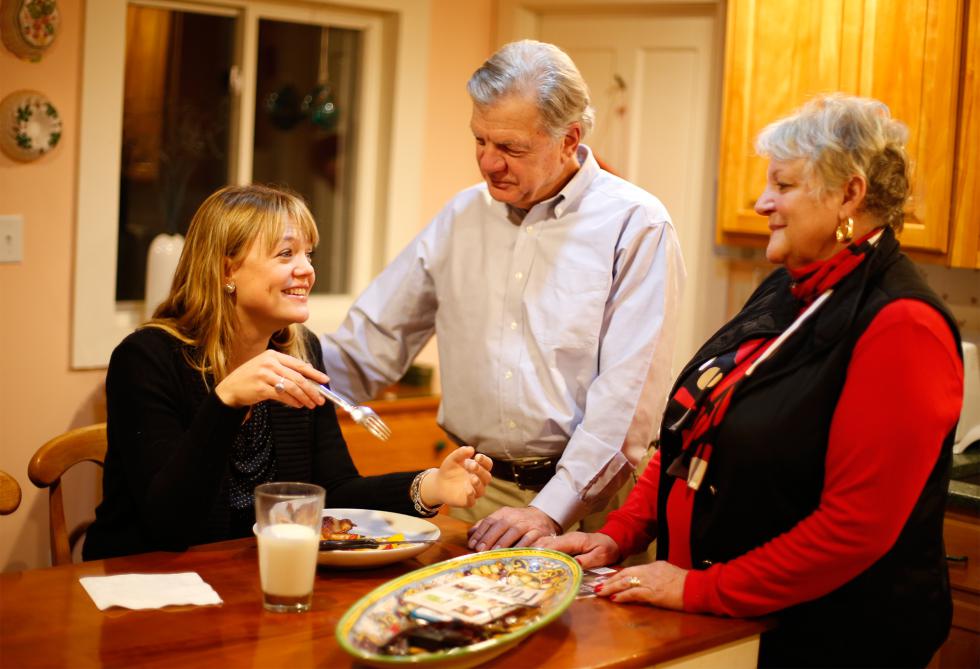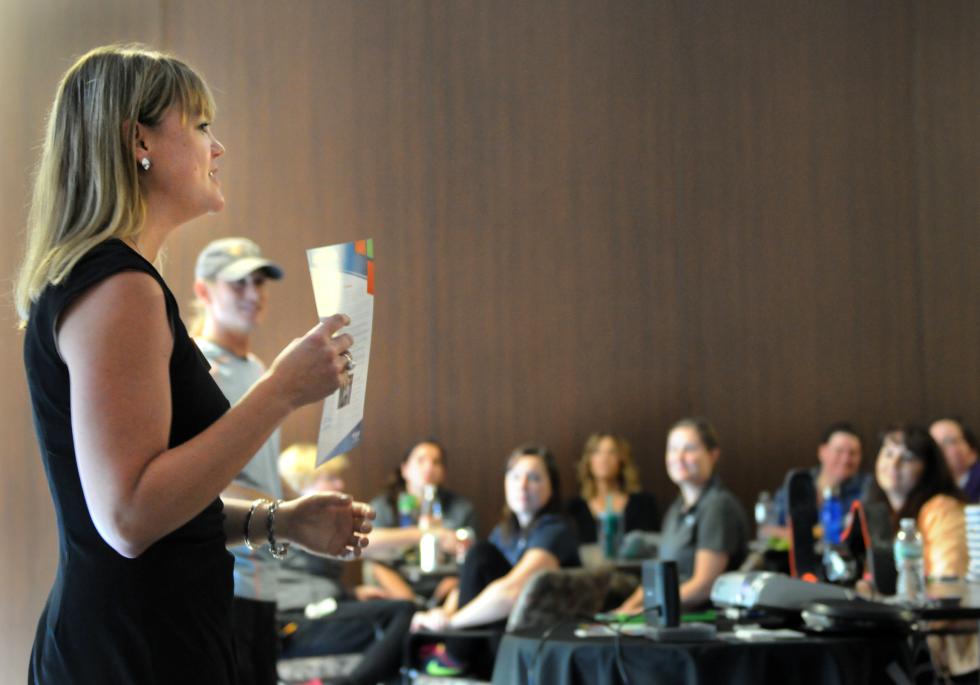Maggie Baumer doesn’t want to sugarcoat it — it was hell losing her arm in a trash compactor. But in a strange way, the loss set her on the path toward a better life.
Many people strive for the fast track, only to find that long hours produce little but exhaustion and a lack of fulfillment. Baumer was no different. The Northampton High grad earned an undergrad degree from Tufts, went on to law school in New York City and took a demanding job at a corporate firm specializing in immigration law.
She worked hard and partied just as hard, often returning to her Chelsea apartment in the wee hours of the morning. It was after one such night in 2012 that a night of revelry ended in the accident that cost her much of her left arm.
As if the painful series of surgeries and loss of a limb weren’t enough, Baumer, now 33, had to endure the cloud of public shame that formed over her as the New York tabloid press and heartless online commentators ridiculed her while she lay in hospital bed. Hers was an agonizing experience, and the memories still bring tears. But now, three years after the accident, she’s found a measure of peace — and a sense of purpose in helping amputees like herself navigate their recovery.
“The accident forced me to reevaluate my priorities,” says Baumer. “After recovering, I felt more awake.”
To meet Baumer on the street, you’d never guess the trauma she has experienced. With blond hair, sky-blue eyes and a quick smile, she exudes an easy charm. After the unexpected turns in her life, she says, she’s happy to be back home.
Baumer grew up on Bliss Street in Florence, where she is now living in her childhood home with her parents. Maggie’s father, Donald Baumer, has taught government at Smith College for nearly forty years; her mother, Polly Baumer, owned Many Hands magazine for 15 years before selling it to the Daily Hampshire Gazette in 2005. Her older brother, Ben, pioneered statistical analysis for the New York Mets and is now a tenure-track math professor at Smith.
Driven to help others — “it’s definitely what makes me tick professionally” — Baumer studied clinical psychology at Tufts after graduating from Northampton High in 2000. Out of college, she began building a career in health care, including a stint working as a counselor at a group home for the mentally ill and hospitals locally and around Boulder, Colorado. She says she enjoyed the work and she learned a lot about illnesses and disorders, but she internalized too much of her patients’ suffering.
“I needed to switch tracks,” she says, adding that she also couldn’t support herself on the income she was making in health care.
Baumer’s sister-in-law was in law school at the time and convinced her to consider it. Baumer says her family encouraged law as a career path, pointing out it make good use of her analytical mind.
“Mental health work is hugely important, but I wanted to use my skills more effectively,” Baumer says. So at 26 she dove into classes at the Cardozo School of Law in Greenwich Village.
For Baumer, law was a language that clicked. Her background in mental health, she says, made her more aware of the psychological issues that can lead to crime and what those factors meant for criminals moving through the court and mental health systems.
But Baumer found the environment of law school to be toxic and cut-throat. It left her with a feeling of being silenced.
Baumer remembers a moment when a professor called on her and she didn’t know the answer. “I got made fun of after,” she says. “I was feeling like people thought I was stupid, that I didn’t belong there.”
Though Baumer says this moment and others like it led to a sense of internalized shame and increased fragility, they also helped to guide her away from criminal law — which, she decided, was simply too harsh of a path.
While working a summer internship between terms at a law firm, she got to work on a case against a group of dental practices that were defrauding elderly patients, convincing them to sign up for high-interest health care credit cards and charging them for work that was never done. This, she decided, was the type of work she wanted to do.
“I felt good about that,” Baumer says. “About fighting injustice and getting a result.”
Despite the epiphany, she graduated law school in 2011 into a struggling economy and job choices were limited. Remembering that Goldstein and Lee — a corporate immigration firm — had been pleasant to work for previously as a legal assistant, she took a full-time job there after graduating.
That first year on the job, she remembers working long hours and having very little time to herself. It was mostly solitary desk work — poring over forms, letters, and visa technicalities.
“It felt like I was squishing life in, so I was doing a lot of going out and drinking on the weekends,” Baumer says, adding that city-dwellers often get stuck in this “work hard, play hard” cycle. “I know it wasn’t the healthiest, but I was frustrated with my daily life. There was this lack of fulfillment.”
Then, on the Friday before Halloween 2012, her life took a drastic turn. A friend was in town visiting and they went out to party. Early in the evening, Baumer had given her keys to her friend so she could go to her apartment and change. Later in the evening, plans had shifted and Baumer ended up back at her apartment without her keys.
Here she was at 4:30 a.m., feeling the effects of a night on the town with no way to get inside. On an earlier occasion, she’d learned she could enter a back courtyard through the basement, stand on a chair and pry open her back window.
Normally, Baumer says, the door to the building’s basement was left unlocked. Normally one of her roommates would be home and able to let her in. Normally, the basement light would be off. But not this night, when she found the trash chute offered a seemingly straight path to the well-lit basement below. A sign beside the chute read: “Don’t throw bottles.”
So feeling desperate to get into the basement and inside her apartment, she went head-first down the chute. At the time, she had no idea there was a trash compactor partway down.
“I had been drinking so I wasn’t using my best judgment,” she says. “I was just confident I could get down there — and I wanted to get inside.”
On her way down, she says both hands were gripping along the wall of the chute, when her left hand found a gap in the siding. That, she says, was where the trash compactor did its work.
“I was trying to feel for the wall and it just clamped onto me.”
Within minutes, she could feel her crushed left arm swelling as she yelled for help. A friend and neighbor heard her cries and called 9-1-1.
It took firefighters a long time to free her arm from the grip of the compactor, she says. She won’t soon forget the way her left hand hung once it was finally freed.
“I was hysterically crying,” she says. En route to the emergency room, she kept telling the paramedic, “I don’t want to lose my hand!”
Over the following three months, Baumer went through 15 surgeries to save her arm. All the while, doctors expressed confidence in their ability to succeed. The first surgery took a vein from her leg and implanted it into her arm.
“I had this weird contraption on my arm and I was on these painkillers,” she says. “I couldn’t eat or drink before surgeries, so I was hungry and thirsty and sucking on ice chips.”
About two weeks after the accident, Baumer says she wanted to check out Facebook while a friend was visiting her in the hospital, but her friend interceded and instead read her posts aloud.
“I figured she was doing that to protect me because there was something I didn’t want to see,” Baumer says.
Shortly after that, she found out what her friend was protecting her from. The New York Post had picked up her story, and it had gone viral from there. “A Recent Cardozo Law Grad Gets Trashed—Literally,” one headline read.
Not so long ago, it would be mostly family and friends who would know the grisly details of an accident. Or if those details appeared in the newspaper or on television, the story would disappear after a day or two. But in the 21st century, such stories live on indefinitely across the web, with just a few clicks of the mouse unearthing the details or another round of callous commentary.
“At least she’ll have a funny story about that one time where she went out and got really ‘trashed,’” wrote one commenter on a website called Above the Law.
“Would you look at that? Somebody threw away a perfectly good white girl,” wrote another.
The misfortune that provided such trolls with a laugh was no laughing matter for Baumer. On top of the fears she felt for her health, her career and her reputation, she said, such cheap shots were “devastating.”
After about ten days in New York hospitals, Baumer returned home to Northampton to recover. She had a wound vacuum over her reconstructed elbow and her homework involved doing hand exercises to regain mobility and strength.
While doing those exercises late one night, she felt her fingers go numb.
Several surgeries later, doctors in Boston determined that there was nothing more to do. They amputated her left arm below the elbow.
“Ok, let’s do this,” Baumer recalls telling the doctors without hesitation. Over a month of fasting and hospital visits had worn her down. “I was so hungry and thirsty, so at that point in time I was ready. I felt like they’d done everything they could.”
That was on November 30, so “that was a really hard Christmas.”
While recovering, the media coverage surrounding her accident continued. She refers to it as a double-edged sword. She didn’t have to tell the story of her accident again and again when the details were simply a Google search away. But the sensationalism and cruelty were hard to bear.
“The media piece was huge,” she says. “If I saw someone I hadn’t seen in a while, it was like this cloud in the air.”
Swimming — a sport she excelled in growing up — proved crucial to her recovery. While many upper body workouts aren’t yet possible without a specialized prosthetic attachment, swimming allows her to use what’s left of her limb to build strength.
“Swimming was really important to my recovery,” she says. “I was able to use both sides of my body. Swimming taught me discipline and stamina, so I was able to bring those skills to the recovery table.”
Because of all the surgeries surrounding her crush injury, it took over a year for Baumer to get a prosthesis — much longer than what is typical. She grew accustomed to the curious stares.
“Navigating the world with a very visible disability is now something I’m comfortable with.”
During that first year of recovery, she says, it was her full-time job to navigate the healthcare world, get approved for a prosthesis, apply for disability payments, and get deferment for her student loans. Her background in healthcare and law, she says, helped her maneuver all the bureaucracy and get the care she needed.
Today, she feels inspired to use those skills to help others.
“I feel very motivated to make that process easier for amputees,” she says. “Many people don’t have the familial support or the education that I had.”
Though the law firm held her job for several months, Baumer decided not to return to the city. Once healed, she took a job with Hanger Clinic in Springfield — a local branch of a national company that has revolutionized the world of prosthetics.
Though she may never again be able to rake the leaves or gather her hair up in a ponytail, she now has a job she truly enjoys helping others who face a similar struggle.
Last February, she started a support group for amputees and people with limb difference through Hanger and Ampower, Hanger’s national Amputee Support Group and Resource Center. Sitting in one of their sessions earlier this fall, I observed Baumer encourage amputees to talk about their feelings and consider the positives that have come from their ordeal.
One attendee, Earl Lannon of Westfield, had his hand crushed three years ago by a machine while on the job. Now, he says, he’s studying engineering and wants to work in the field of prosthetics.
Baumer tells me it “warms my heart” to see people like Lannon benefiting from the community she’s helping to create.
“She’s really helped a lot of people and is very passionate about the work that she does,” says Hanger vice president Dennis Huysman.
She’s also played an important role in forging a partnership between Hanger and the Trauma Survivors Network, a Virginia based nonprofit. In her free time, Baumer also is president of the board of Women’s Voices Worldwide, which helps women hone their public speaking skills.
Maggie’s mother, Polly Baumer, says her daughter’s courage over the past few years has had a major impact on those around her. “Her strength and resilience was inspiration to all of us,” she says. “We couldn’t fall apart seeing her as strong as she was.”
“I have been struck by my daughter’s courage,” she says. “As a mother, you hope you’ve instilled courage in them and you hope you’ve done whatever you can to provide whatever they need when faced with disaster, and I’ve just been so pleased to see how Maggie has handled this.”
In June, Baumer participated in the Endeavor Games at the University of Central Oklahoma. In the competition for athletes with physical disabilities, Baumer participated in four swimming events and won every one. The event’s organizer was so impressed that she urged Baumer to get a coach and train for the international competition.
Call it an act of God, twist of fate, or simply an opportunity utilized, Baumer says she was able to turn an unfortunate accident into a force for positive change — and not just in her life.
“When you’re on a good path, everything just falls into place,” she says. “And I feel like that’s happening for me.”•
Contact Amanda Drane at adrane@valleyadvocate.com

